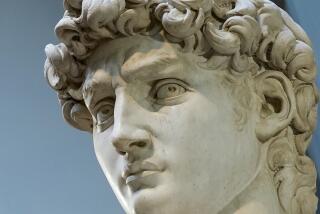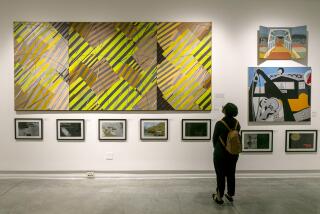Firm Did Big Trade in Fake Art Prints, FTC Charges
- Share via
Federal Trade Commission officials Thursday disclosed a civil suit alleging that a Beverly Hills-based art publishing operation has produced and sold at least 22,000 fraudulent prints attributed to famous artists, primarily Spanish surrealist Salvador Dali.
The agency received a temporary restraining order in U.S. District Court on Monday freezing the assets of Magui Publishers and its owner, Pierre Marcand, described in court documents as one of the nation’s leading suppliers of fraudulent art. Judge Ronald S. W. Lew also appointed a temporary receiver over the firm, which the FTC estimates has received from $6.6 million to $44 million from sales of fraudulent prints to galleries throughout the nation. The galleries allegedly resold the prints as investment-quality art.
The order was sealed until Thursday so that Magui’s assets could be frozen without Marcand being alerted, Marcy J. K. Tiffany, director of the FTC’s Los Angeles Regional Office in West Los Angeles, told a press conference Thursday.
Tiffany and the lawsuit say that agency officials concluded after a six-month investigation that Marcand, a French national who has been sentenced to jail on similar charges in Italy and is still facing prosecution in France, manufactured and sold from his Beverly Hills home as many as 1,000 copies each of 23 Dali titles. The copies, bearing forged Dali signatures, sold to galleries for $500 to $2,000 each and retailed at up to $6,500, Tiffany said. Government experts estimated the true value of the copies as approximately equal to that of a common commercial print. The company also produced smaller quantities of counterfeit works by French artists Marc Chagall and Bernard Buffet, Tiffany said.
Loss Estimated
The loss to purchasers could be from $33 million to $143 million, Tiffany said. The wide range reflected the amounts paid for prints the agency has recovered. Most of the prints believed sold by Magui remain in the hands of purchasers, who may not yet suspect that their art works are fraudulent, Tiffany said.
Marcand, who is believed living in Los Angeles, was unavailable for comment Thursday. However, his attorney, David P. Steiner, denounced the court filing as a “fraud being perpetrated by the FTC” against Marcand.
He asserted that Marcand knew Dali personally and was reproducing prints under the artist’s authorization, obtained “indirectly through agents and business managers.”
He said his client and the artist had had no direct dealings since 1981.
Marcand has not been charged criminally, although the case has been under investigation by Beverly Hills police. The civil proceeding against Marcand carries no penalties but is intended to recover some of the consumer losses and force the company out of business, Tiffany said.
Court Hearing Set
A federal court hearing has been set for Aug. 7 on the agency’s request for a permanent injunction.
In a memorandum presented to the court, the agency characterized Marcand as a notorious international art counterfeiter.
The document said Marcand has entered into a consent judgment with the New York attorney general that enjoins him from selling counterfeit art works in New York state. The memorandum said he was also sentenced to one year and two months’ imprisonment and fined 2 million lira by an Italian court and is scheduled to appear for trial in Nice, France, on charges of selling counterfeit art.
In response, attorney Steiner lashed out at the agency Thursday afternoon for what he termed “calculated use of the media” and secretly bringing an action against his client.
“Clearly this case is about fraud, but the fraud is being perpetrated by the FTC,” Steiner said.
Steiner said Marcand was not notified of the charges against him in Italy and was not present during his trial. He said the French charges have been dropped. Both cases stemmed from complaints of competing vendors, Steiner said.
Lt. Russ Olson of the Beverly Hills Police Department said Marcand’s name turned up frequently as a principal in three continuing investigations into sales of fraudulent art works in the city.
Olson said Marcand appeared to function “like a hub” in the center of several suspected outlets of counterfeit works. Yet, Olson said, the department could not develop sufficient evidence to prosecute Marcand criminally, although it expects other criminal prosecutions to result from the investigations.
He said the department shared its information with the federal agency.
Tiffany said the agency’s estimate of 22,000 to 32,000 prints marketed by Magui was derived from examination of the company’s records.
Tiffany said the prints have been distributed to half a dozen galleries throughout the United States.
She said the agency seized prints from the Federal Sterling Galleries of Scottsdale, Ariz., a “boiler-room operation” that sold through aggressive telephone solicitation, and the Austin Galleries in Chicago. Both galleries were closed by previous FTC actions. Other law enforcement agencies have found fraudulent Magui prints being sold at Shelby Art Inc., a Colorado gallery, and at two local galleries, the Signature Fine Arts Gallery in Newport Beach and T. R. Rogers Gallery in Beverly Hills, both now closed, Tiffany said.
Recently, Marcand has shifted his business toward international markets, primarily Japan, she said.
At the press conference in the Federal Building in West Los Angeles, Tiffany displayed four purported Dali prints which experts consulted by the FTC have declared to be counterfeit. Two of them were purchased by FTC agents through a gallery that cooperated in its investigation. A copy of Dali’s “The Perseverance of Memory” cost the agency about $500 and “Lincoln in Dalivision” about $2,000, she said.
David R. Spiegel, attorney for the commission, said the agency’s investigation has resulted in the seizure or purchase of 493 such counterfeit prints.
Spiegel said the prints were reproduced from engravings made under Marcand’s supervision. The engravings were used to print multiple numbered lithographs. The numbers were meaningless, however, because many were repeated, Tiffany said.
Each print was accompanied by a certificate of authenticity listing Dali as the artist, Spiegel said.
‘Dali Did Not Sign’
“In fact, the evidence shows that Dali did not sign the prints and had no connection whatsoever with their creation or production,” the memorandum said. “They have no current market value and no worth as investments.”
Dali, who died in January, was in declining health during the period in which most of the prints were made, Spiegel said.
But Steiner, Marcand’s attorney, said the prints were made with Dali’s authorization.
Times staff writer Elizabeth J. Mann contributed to this article.
More to Read
The biggest entertainment stories
Get our big stories about Hollywood, film, television, music, arts, culture and more right in your inbox as soon as they publish.
You may occasionally receive promotional content from the Los Angeles Times.











